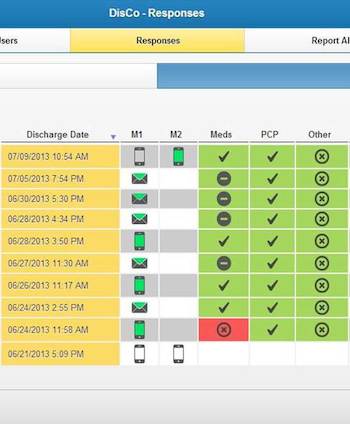 Boston Children's Hospital released data from a discharge app pilot they launched last year and announced three partnerships, with Rock Health, IBM, and Grand Rounds. Early data from the Boston Children's discharge app pilot found that 99 percent of patients said the app was useful, up from 82 percent from the first phase of the pilot, which ended two years ago.
Boston Children's Hospital released data from a discharge app pilot they launched last year and announced three partnerships, with Rock Health, IBM, and Grand Rounds. Early data from the Boston Children's discharge app pilot found that 99 percent of patients said the app was useful, up from 82 percent from the first phase of the pilot, which ended two years ago.
The discharge app used for these pilots, called DisCo, was developed in-house after the Boston Children's providers noticed that their current discharge system had a number of issues.
“I need to get families from the hospital setting back home, and they are in an incredibly vulnerable position at that point," Boston Children's Hospital Pediatric Nurse Practitioner Kelly Dunn said at the HIMSS Connected Health Conference where she shared data from the two pilots.
In the hospital patients are used to having 24-7 access to healthcare professionals to answer questions about their condition. But these days, Dunn said hospitals often send patients home sooner than in the past and expect that parents will provide care for that child at home.
"A staff nurse would sit at a desk and spend a couple hours calling each and every family who was discharged at home," Dunn said. "As you can imagine we got a lot of voicemail, we got a lot of, 'Mom’s at work, here’s grandma,' but she doesn’t know what the answers to the questions are. Maybe when we called they didn’t need us but 10 minutes after we called, someone needed us. This was centered [on] what was working for us, not what the parents needed."
This system was inefficient, she continued, so the Boston Children's FastTrack Innovation in Technology (FIT) Award team worked with clinicians at the hopsital to develop an app that parents and caregivers could use to send updates to the inpatient team. The care team uses DisCo to send patients two messages, which they can receive via text or email. The messages have a link to a survey that asks standard followup questions. Once answered, the data are then sent back to the care team, who can view in a dashboard. If a patient indicates that they have had an issue, the care team is able to contact that patient.
In the first pilot, which was conducted between April 2013 and October 2013, the hospital enrolled 140 patients. About 52 percent of these patients chose to communicate via text while 48 percent communicated by email. In total, 65 percent of enrolled patients, 91 participants, responded. Within this group, 17 patients reported issues, which was 12 percent of total participants enrolled, while 74 did not have any issues.
Caregivers reported issues like concerns about new symptoms, questions about follow up, and questions about prescriptions. Within seven days of the discharge, six of the patients had an unplanned re-presentation -- which means they showed up again, though they were not necessarily admitted -- to the Boston Children's Hospital emergency department or inpatient service.
The second pilot, which launched in July 2014 and involved an additional pediatrics inpatient floor, enrolled 554 patients. This time, 72 percent chose text messaging and 28 percent chose email as their preferred communication method. Of the 286 participants that responded, 30 participants, or 5 percent of the total group, had issues, while 90 percent of the group responded without issues. This data was recorded as of October 2015, though Dunn noted that the pilot is still ongoing.
Dunn also pointed to three downsides to the app, which they identified during the pilot. First, parents have just one opportunity to respond, and if they identify issues after they have already used their response, they need to find their own way to get back in touch with their pediatrician. Additionally, although the Boston Children's population speaks a variety of languages, the app is only available in one language. The final downside is that the team noticed there were false positives in the data. A small number of parents reported an issue, but when a clinician called, they said they were fine.
In other news, Boston Children's also announced three new partnerships this week. The provider partnered with digital health-focused seed fund Rock Health to speed up the development of pediatric-focused digital health technologies.
“We’re excited to form this collaboration with the leading digital health early-stage venture capital firm,” John Brownstein, Chief Innovation Officer at Boston Children’s said in a statement. “It’s easy for our innovators to get lost in the commercialization process, and most can’t carve out the time to move an idea forward. With this partnership, they will have access to strategic guidance, funding and resources to accelerate project development.”
Boston Children's has been involved with developing digital health offerings for at least five years now. Under the leadership of the former Chief Innovation Officer, Naomi Fried, who is now at Biogen Idec, Boston Children’s premiered a number of programs that have made the hospital well known as a trail blazer for leveraging health technology. The Innovation Acceleration Program she began in 2010 led to multiple other ventures including the FastTrack Innovation in Technology (FIT) Award, the Innovestment Grant, and, just recently “Innovation Tank”, a Shark Tank style event.
Boston Children's also announced it was partnering with IBM to use Watson to help clinicians identify possible diagnosis and treatment options for rare pediatric diseases and partnering with Grand Rounds to provide parents with second opinions for medical issues online.
















